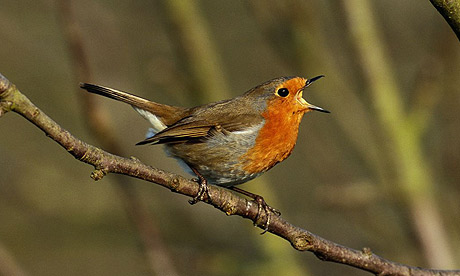Birds face threat to their survival as they make music at night in a bid to be heard above traffic
Songbirds in cities are damaging their health, exposing themselves to predators and weakening their gene pool by trying to be heard above the din of urban life.
New research shows that male birds trying to compete with traffic and city sounds are singing louder and at increasingly higher frequencies, which could harm their vocal cords and hearing. As a result their songs are becoming more chaotic and less diverse, which makes them less attractive to female birds and damages their mating opportunities. Some birds, including robins, are choosing to sing at night instead of during the day. This not only makes them more vulnerable to attack but, because the birds need to be awake in daylight hours to feed, creates stress and exhaustion.
'The difference between urban and rural birdsong is becoming so great that the two groups could now be unable to communicate, leading to inbreeding and a weakened gene pool,' said Dr Sue Anne Zollinger, of the University of St Andrews, who has studied the impact of environmental noise on birds' song learning and development. A group sharing a small gene pool, said Zollinger, was less likely to be able to adapt quickly to new diseases or environmental pressures, putting them at risk of being wiped out.
Birds sing to warn of danger, attract a mate and mark out their territory. Another study of the dawn chorus of nightingales found that birds in Berlin sang up to 14 decibels louder than their counterparts in the forest. The highest volume occurred on weekday mornings. A further group found that great tits in European cities sang at a higher frequency than birds in the country, so that they could be heard above the rumble of cars, lorries and industry.
More...






 Reply With Quote
Reply With Quote




Bookmarks